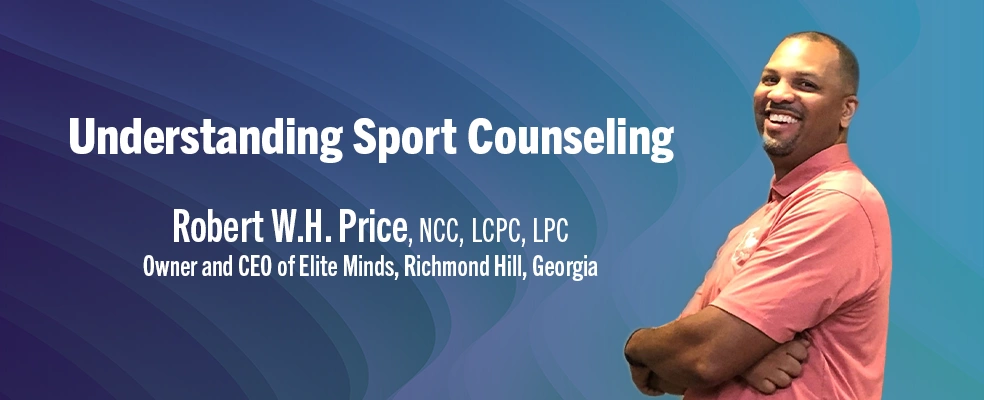
The field of sport counseling is broad, encompassing many aspects of an athlete’s well-being and the effects of mental health on performance.
As the founder and CEO of Elite Minds, LLC, Robert W.H. Price, NCC, LCPC, LPC, is concerned with the mental aspects that may affect athletes in action. Price is a mental performance coach, and he and his team have worked with individuals of all ages, including members the NFL, U.S. Army, the PGA Tour, and other sports organizations. In addition to mental performance coaching, Elite Minds also offers individual and family counseling through mindfulness, cognitive behavioral therapy, eye movement desensitization and reprocessing (EMDR), and creative art and play therapy.
“Elite Minds has been serving athletes since 2000 and providing clinical services since 2008,” Price says. “I work with children as young as 8 years old through adults. I have been very blessed to work with a wide variety of athletes, including all the major sports and some Olympic sports as well.”
Price began considering this field of work during high school.
“I played sports at a very high level, and I always knew that there was a mental component to what makes an athlete great,” he says. “I also knew that this was a less intimidating way to introduce the mental health and counseling field to a population where these services are stigmatized.”
Sports and competition can have a major impact on a person’s mental health and well-being, Price says.
“Sport, in and of itself, is an important tool for everyone’s well-being,” he says. “Exercise has so many benefits, and athletics combines those benefits with being a part of team or competing for a common goal.”
There may come a time that athletes run into mental roadblocks. “Athletes should seek out services from a mental performance coach or sport counselor if they want to gain tools to perform more consistently and manage the stressors that accompany competition,” he says. “This may look different for many people, but being proactive is always the best-case scenario,” he continues. “Many people seek services because they are experiencing some struggles in competition and feel like they are not reaching their potential.”
The most common challenge Price sees at every level is a lack of confidence, he says, adding that when an athlete loses confidence, they often begin to struggle with meeting and maintaining expectations.
When beginning to work with a client, he first has them complete an assessment of mental skills that are important for them to perform more consistently. Next, they ascertain the athlete’s goals and expectations and form a plan of action for making that progress.
What clients learn through performance coaching can be applied on and off the field, Price says.
“The skills that are taught are transferable to every area of the client’s life. Everyone needs to learn how to manage expectations, thrive when failure comes, and manage anxiety and stress. These skills are taught through the lens of sport for the client, and direct examples to their everyday life tasks can be made throughout these services.”
He recommends that anyone interested in sport counseling or performance coaching understands the complexity of the field.
“I would say that they need to do a great job researching, and I always direct people to the Association for Applied Sport Psychology (AASP). This organization has come a long way in trying to demystify the field and provide a structure for those now entering this profession.”
Though sport counseling/mental performance coaching and sport psychology are both concerned with improving the mental fortitude of athletes through evidence-based approaches, professionals who work in the field of sport psychology are typically licensed psychologists. Price says it’s crucial to make that distinction to clients and that they understand the differences.
“The difference between the two should be clear to the client,” he says. “Mental performance coaching should not address clinical issues that the athlete may or may not be having. If those are present, then you can refer them to a clinician. Because I could self-refer, then the relationship and services are communicated directly with the client and their family—that we are now providing clinical services and we will be utilizing a therapeutic approach. To maintain professional integrity, these two services should not be done in conjunction but separately.”
He and his team strive to help clients develop a champion mindset.
“It’s about being able to accept that sport is filled with many types of failures and preparing for their arrival with a plan,” he says. “Then you are able to manage the expectations and perform consistently in spite of what might be thrown your way during competition.”
Robert W.H. Price, NCC, LCPC, LPC, received his bachelor’s degree in psychology and special education from Hampton University, a master’s in kinesiology and sports psychology from the University of Maryland, and a master’s in clinical community counseling from The Johns Hopkins University. He founded Elite Minds, LLC, in 2000.